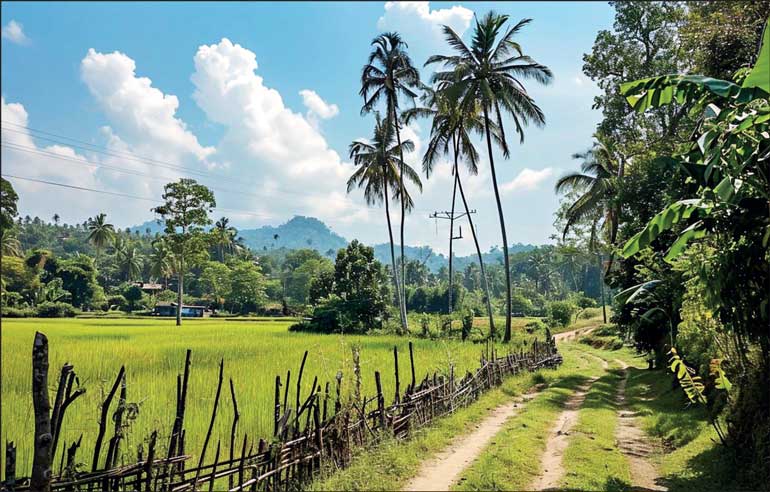Tuesday Feb 17, 2026
Tuesday Feb 17, 2026
Saturday, 6 January 2024 00:09 - - {{hitsCtrl.values.hits}}

Adaptation is highly context-specific and implemented at the local and national level, but global processes can support and amplify these efforts
 Adaptation to climate change is a key challenge faced especially by climate-vulnerable countries such as Sri Lanka over the coming years and decades. All key economic sectors and elements of society need to be risk-aware, climate-proof, and adjusted to the changing conditions in ways that minimise negative impacts and take advantage of positive opportunities. For example, this includes comprehensive climate risk management, climate-smart agriculture, climate-resilient entrepreneurship, blue and green economies, and changes to education, skill development, and training systems.
Adaptation to climate change is a key challenge faced especially by climate-vulnerable countries such as Sri Lanka over the coming years and decades. All key economic sectors and elements of society need to be risk-aware, climate-proof, and adjusted to the changing conditions in ways that minimise negative impacts and take advantage of positive opportunities. For example, this includes comprehensive climate risk management, climate-smart agriculture, climate-resilient entrepreneurship, blue and green economies, and changes to education, skill development, and training systems.
While adaptation is highly context-specific and must be implemented at the local and national level, global processes can support, scale up, and amplify these efforts. The Paris Agreement under the United Nations Framework Convention on Climate Change (UNFCCC) has established a Global Goal on Adaptation (GGA) to provide an overarching vision, mobilise resources, and measure progress on adaptation across the nearly 200 countries which are signatory to the Agreement.
COP28 as a watershed moment
At the end of 2023, Parties to the UNFCCC and the Paris Agreement came together in Dubai, UAE, for the 28th Conference of the Parties (COP28). Among other negotiation items, the GGA featured prominently on the agenda, which saw the conclusion of the two-year Glasgow-Sharm el-Sheikh work programme, the adoption of a GGA framework, and the establishment of a new work programme called the UAE-Belém work programme.
First off, the GGA decision concluded the previous work programme, which had seen technical discussions around the GGA across eight workshops and continuous engagement between countries since 2022. This process created the foundation for the creation of a GGA framework, which was ultimately adopted at COP28 to “guide and strengthen efforts, including long-term transformational and incremental adaptation, towards reducing vulnerability and enhancing adaptive capacity and resilience, as well as the collective well-being of all people, the protection of livelihoods and economies, and the preservation and regeneration of nature, for current and future generations, in the context of the temperature goal referred to in Article 2 of the Paris Agreement.”
The decision text also highlights the importance of this framework being inclusive in terms of a diversity of adaptation approaches and using the best available science as well as the worldviews and values of Indigenous Peoples. Furthermore, it outlines vital cross-cutting considerations and enabling factors for adaptation, such as climate education, local and Indigenous knowledge, the roles of different stakeholders—including the private sector, local governments, academia, and communities—and transboundary management and cooperation.
A framework for the Global Goal on Adaptation
The GGA framework defines a series of seven broad targets as well as four targets connected to different steps of the adaptation cycle. The seven broad targets revolve around water and sanitation, food systems, health, ecosystems and biodiversity, infrastructure and human settlements, livelihoods and social protection, and cultural heritage. Regarding the adaptation cycle, the four targets refer to climate impact, vulnerability, and risk assessments; adaptation planning processes, such as National Adaptation Plans (NAPs); the implementation of adaptation actions; and monitoring, evaluation, and learning systems. Fundamentally, the GGA framework aims to “accelerate swift action at scale and at all levels, from local to global, in alignment with other global frameworks,” which could include, for example, the Sustainable Development Goals or the Global Biodiversity Framework.
Furthermore, the COP28 GGA decision affirms that adaptation should be country-driven, voluntary, and in accordance with national circumstances, as well as avoid additional reporting burdens for developing countries. Crucially, it also recognises that the implementation of the GGA framework and the implementation of adaptation actions requires means of implementation, including finance, technology transfer, and capacity-building, and that developed countries need to at least double their collective provision of climate finance for adaptation by 2025.
The decision calls on developed countries in particular, but also on United Nations organisations, specialised agencies, bi- and multilateral agencies, and other relevant organisations, such as the Adaptation Fund and the Green Climate Fund, to scale up funding and support for adaptation and enable developing countries to effectively work towards achieving the GGA and its targets. In addition to finance, technology, and capacity-building, it also highlights factors such as leadership, institutional arrangements, policies, data and knowledge, skills and education, public participation, and strengthened and inclusive governance as important enablers for adaptation.
Looking ahead
After COP28, it is clear that discussions, negotiations, and work around the GGA will continue. For example, Parties will need to operationalise the framework’s targets, explore the connections between the GGA and the second Global Stocktake, and decide on adaptation funding in the new collective quantified goal on climate finance, which will be a key topic for discussion in 2024.
The new UAE-Belém work programme will aim to develop ways for measuring progress towards the targets mentioned above, including through potential indicators, metrics, and other quantified elements. Like the previous work programme, this will be carried out jointly by the Subsidiary Body for Scientific and Technological Advice (SBSTA) and the Subsidiary Body for Implementation (SBI) and take place over two years throughout 2024 and 2025.
While the GGA provides a goal for adaptation under the UNFCCC process and the Paris Agreement, countries need to find ways to connect their national efforts to this global goal and its targets to mobilise additional resources and support. For climate-vulnerable developing countries such as Sri Lanka, this could be a key opportunity in 2024 and beyond towards transformative climate action and effective adaptation across all vulnerable sectors and segments of society.
(The writer works as Director: Research and Knowledge Management at SLYCAN Trust, a non-profit think tank based in Sri Lanka. His work focuses on climate change, adaptation, resilience, ecosystem conservation, just transition, human mobility, and a range of related issues. He holds a Master’s degree in Education from the University of Cologne, Germany and is a regular contributor to several international and local media outlets.)